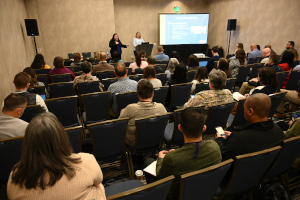
Sara MacKenzie of North Carolina State University, and Julia Ross from Professional Tutoring LLC, presented their session Disaster Recovery: Helping Students Overcome Poor Decisions in Admissions and Retention to a packed room of higher education professionals Monday morning in Aurora, Colorado at the 108th AACRAO Annual Meeting.
The presenters opened their session by examining the phases of maturity in the human brain, the trends and current landscape for students, and a rising shift in higher education regarding initiatives like "Ban the Box," a push to remove questions regarding criminal history, disciplinary history, and the like from admissions applications.
The presenters noted that while "Ban the Box" has been generally popular, around 55% of higher education institutions continue to ask these questions on their admissions applications. Asking these questions can have serious DEI implications for institutions when considering the following:
- 30% of Americans have been arrested by the age of 23
- 44% of those Hispanic
- 49% of those Black
- 38% of those White
- 62% of students with felony convictions did not complete their admissions application compared with 21% of the application pool
What are we looking for?
The presenters continued by looking at some of the reasons institutions ask disciplinary-type questions on their applications in the first place. Some of the reasons examined included:
- Community Building
- Protecting Student body
- Weighing the Risk Factors
- Protecting Campus Safety
One of the presenters noted that her institution no longer asks disciplinary questions unless the applicant has been recommended for admission. Additionally, the questions themselves have been updated to specifically exclude things like speeding. These small changes have had an outsized impact on the process allowing their team to save a significant amount of time.
Case Studies & Application Review
In the second half of their session, the presenters provided a series of case studies encouraging attendees to vote on whether they would recommend or deny admission at their institution.
Case Study 1:
Andrew was an 11th Grader caught stealing beer from their neighbor’s garage. They were convicted of two misdemeanors for theft and sentenced to one week at a juvenile detention center.
The room was asked whether they would admit this student. The vast majority of attendees voted that they would admit the student. Following up on this case study the presenters recommended some best practices when reviewing cases like this asking whether the applicant:
- Faced the problem
- Took responsibility
- Coordinated or looked for advocacy
- Communicated their intentions
Case Study 2:
John, a military veteran, was convicted of 2nd-degree felony murder. He served 9 years and 9 months for a crime of passion. While incarcerated John completed an associate's degree and was seeking to transfer into operations supply chain management. Additionally, John submitted a letter with his application admitting his crime, the remorse he felt for his actions, and his hope to rebuild his life.
After some vigorous debate, the room voted with a minority saying they “would admit”, and most would not vote until they’d read the testimony. Once the full testimony was shared, most voted yes to admit.
Later, attendees learned that "John" was not admitted, but that another school did eventually admit him (within the same system).
Overall, this session was an interesting window into the oft-complicated and engaging work that happens behind the scenes at most institutions.